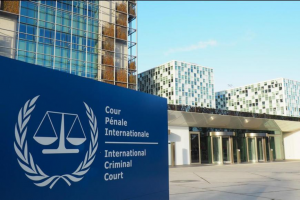By: Hannah Gabbard
Journal of Global Rights and Organizations, Editor-In-Chief
WASHINGTON, District of Columbia – On October 1, 2020, the Open Society Justice Initiative, a public interest law center dedicated to human rights, and four international law professors filed a complaint in federal court against the United States government challenging Executive Order 13928.

Executive Order 13928, Blocking Property of Certain Persons With the International Criminal Court was issued on June 11, 2020, and implemented under the Treasury Department Office of Foreign Assets Control regulation promulgated on September 30, 2020. Citing the U.S. Constitution, the International Emergency Economic Powers Act (IEEPA), the National Emergencies Act, the Immigration and Nationality Act, and Title III of the United States Code, Executive Order 13928 declared a national emergency and threatened sanctions against International Criminal Court (ICC) officials. Executive Order 13928 specifies that the ICC action including “illegitimate assertions of jurisdiction over personnel of the United States and certain of its allies, including the ICC Prosecutor’s investigation into actions allegedly committed by United States military, intelligence, and other personnel in or related to Afghanistan” poses an “unusual and extraordinary threat to the national security and foreign policy of the United States.”
The plaintiffs primarily allege that Executive Order 13928 violates their First Amendment right to freedom of speech. Moreover, plaintiffs allege that the Executive Order is a violation of the Due Process Clause of the Fifth Amendment, is ultra vires under the IEEPA, and is a violation of the Administrative Procedure Act. The plaintiffs’ prayer for relief includes a declaration that the Executive Order violates each of their alleged claims, a request that the Court enjoins the defendants from enforcing the Executive Order against the plaintiffs, and for incurred costs and attorneys’ fees.
In March 2020, the ICC Appeals Chamber authorized the ICC Prosecutor to begin an investigation into alleged crimes against humanity and war crimes committed during the armed conflict in Afghanistan since May 2003. Afghanistan ratified the Rome Statute in 2003 which establishes the ICC’s jurisdiction over designated crimes committed in Afghanistan or by its citizens. This nexus implicates United States citizens for any conduct impermissible under the Rome Statute committed since 2003. However, due to restrictions in place throughout the coronavirus pandemic, the ICC is not currently taking any investigative steps in Afghanistan.
Since President Trump issued Executive Order 13928, numerous ICC member countries, human rights organizations, and legal scholars have spoken out against this action and indicated their support for the mission and role of the ICC as an independent judicial organization. Markedly, Human Rights Watch highlighted that the ICC is the “latest target of his administration’s contempt for the global rule of law.”
In attacking an institution that aims to provide accountability for the perpetrators of human rights abuses, the Trump administration further weakens its global leadership on human rights and the United States’ relationship with international institutions. As the election in the United States unfolds over the next month, the likely posture assumed towards the ICC hangs in the balance.
For further information, please see:
Human Rights Watch – US: Lawsuit Challenges ICC Sanctions – 2 Oct. 2020
The Guardian – Human rights lawyers sue Trump administration for ‘silencing’ them – 1 Oct. 2020